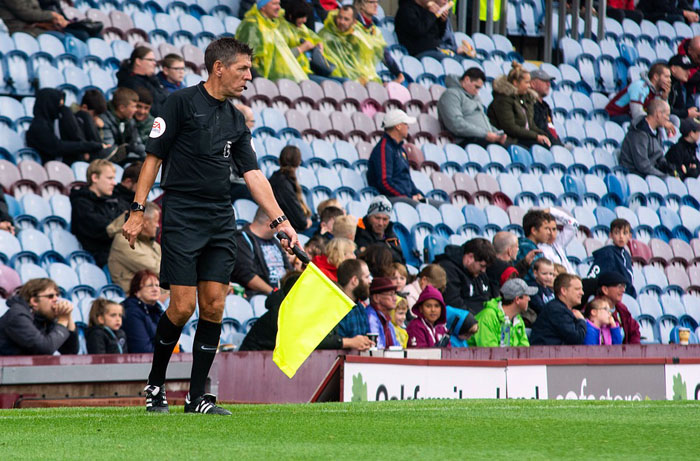The energy demands of being a field official, referee or umpire varies as much as there are different sports to be involved in. Activity levels can range from an hour or two of continuous running as in a football game, to sitting in a chair all day umpiring tennis. Specific nutrition strategies are more important for those sports with a higher level of activity requirement. However, all field officials can benefit from improved nutrition and proper hydration strategies.
 Football referee
Football refereeThis article will briefly cover some of the most common nutrition issues for a field official, such as eating well to stay fit and healthy, preparation for and recovery from training and games, and fluid intake for good hydration. If you require more information, seeing a qualified sports dietitian for an individual consultation is recommended.
Staying fit and healthy
A training diet should be optimal in all the nutrients that an exercising athlete needs. The most important nutrient is carbohydrate, which provides the body with energy. Carbohydrate is the most efficient fuel source for the exercising muscles. Carbohydrate foods, such as breads, cereals, pasta, rice, potato and fruit, are needed at every meal and snack to help fuel the body.
Protein is another important nutrient, which contains the building blocks for our body. Be sure to eat protein foods like, fish, low fat dairy products, chicken, eggs, legumes and meat, to help maintain muscle strength and assist in muscle growth.
Other nutrients, such as iron, calcium and fiber are also important to include in a healthy diet. Iron is found in lean red meats, wholegrain cereals, eggs, and leafy green vegetables. The best source of calcium is low fat dairy products. Wholegrain breads and cereals, fruit and vegetables is where fiber is found.
Aim for nutrients rich foods at all meals and snacks to help boost your energy levels to allow fitness to improve, and to keep the body functioning and healthy.
Match Preparation and Recovery
Ideally, a light, high-carbohydrate meal should be eaten at least two hours before a match. Breakfast cereal plus fruit, pasta with tomato sauce, rolls or sandwiches, baked potatoes with low fat fillings and fruit salad with yogurt are all good options.
Experiment to find the best one for you. Make sure that you are
well fueled for every exercise session.
Recovery from exercise is one of the most important aspects of training
and maintaining energy. During training or games, carbohydrate muscle
stores are depleted and need to be replenished immediately after
exercise. Often game venues do not provide optimal snacks for refueling.
Organize to have suitable drinks and snacks available after the
match. Examples such as sandwiches, fruit, soup, cereal bars, yogurt
and carbohydrate drinks will get recovery off to a good start.
Fluid and Hydration
Sweat rates during exercise can vary considerably between individuals. Firstly awareness of sweat losses is the first way to determine how much fluid needs to be replaced. 1 kg of weight loss during exercise equates to 1 litre of fluid loss. Losses also vary depending on the environmental conditions. The hotter the environment the greater the sweat rate.
Good hydration is necessary even for low activity level field officials. Dehydration, the result of poor fluid intake will affect reaction time and decision making on the field, which is a crucial part of being a field official.
For many sports, the opportunity to drink as an official may be limited during an event, so it is important to begin the game well hydrated, and take every opportunity to have a drink during breaks in play. Sports drinks encourage better fluid intake because of their taste, as well as supplying extra fuel during a session.
Nutrition and hydration can be just as important for the field official as for the sports people themselves. Aim to stay healthy, well fueled and well hydrated for best performance.
Related Pages
- Sports Nutrition for Specific Groups
- Fitness Testing for Sports Officials
- FIFA fitness tests for referees


 Upcoming Events
Upcoming Events